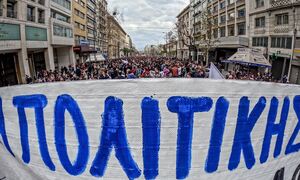New "bombs" from the Budget Office of the House

They foresee for third loan while Samaras and Venizelos "rip" the... memorandums
Five sources of uncertainty for the Greek economy, "is seen" by the new quarterly report of the Budget Office of the House, noting that the probability that Greece to receive a third loan with a new memorandum is open!
The Office also mentions that the red loans are increasing dramatically, the funding of private economy moves slowly, exports decline despite the drop in labor costs, investments continue descending etc.
The sources of uncertainty
First, the issue of banks, despite the recapitalization, has not be solved since is pending a solution to the non-performing loans, which continue to rise and reduce the lending capacity of banks.
According to data for the end of the first quarter of 2014, which were announced to the Greek Parliament by the new Governor of the Bank of Greece, loans in arrears over 90 days stands at € 77 billion or 36% of the total loan portfolio in April versus 32% in the same period last year. Of this amount, € 42 billion is business loans, € 25 billion in mortgages and € 10 billion in consumer loans. If in the above loans add the already restructured but which have again become non-performing, the figure stands at 40%! According to a recent report by the IMF, the share of non-performing loans in Greece is one of the largest in the world, which exceeds levels of other countries that have led to systemic crises.
Second, the delay to the reform can cause re rise in lending rates of the country. It should be noted that even without "memorandum" the country is still under supervision, assuming that it will not turn to the ESM.
But the likelihood is that it will call for loans in this or any ad hoc transnational 'vehicle'. In this case there will be new contractual commitments. The EU estimates that the years 2014-2015, the additional financing requirements of Greece will amount to € 14,9 billion (€ 2,6 billion in 2014 and € 12,3 billion in 2015 ).
If this is confirmed, Greece should either continue to borrow from international markets (which is already difficult) or refer to the ESM, something that involves a new adjustment program (and contract) in accordance with the rules of the ESM.
Third, investments continue to fall
Fourth, fiscal consolidation is facing obstacles,
Fifth, public debt is as a sword of Damocles hovering over the Greek economy and averts the serious domestic and foreign investors.
The export apnea, despite the reduction in labor costs, shows among others, the difficulties of achieving a sustainable development. Obviously, the apnea is due to a whole range of structural-institutional factors such as high energy costs that borne the bulk of heavy industry, the high taxes and administrative costs.
Another source of uncertainty is that there has been some minimal consensus between the major political forces. This means that the continuity in key elements of economic and social policy is not guaranteed













